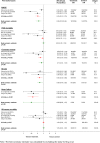Effects of the Mediterranean Diet on Cardiovascular Outcomes-A Systematic Review and Meta-Analysis
- PMID: 27509006
- PMCID: PMC4980102
- DOI: 10.1371/journal.pone.0159252
Effects of the Mediterranean Diet on Cardiovascular Outcomes-A Systematic Review and Meta-Analysis
Abstract
Background: A Mediterranean dietary pattern is widely recommended for the prevention of chronic disease. We sought to define the most likely effects of the Mediterranean diet on vascular disease and mortality.
Methods: We searched MEDLINE, EMBASE and the Cochrane Central Register without language restriction for randomized controlled trials comparing Mediterranean to control diets. Data on study design, patient characteristics, interventions, follow-up duration, outcomes and adverse events were sought. Individual study relative risks (RR) were pooled to create summary estimates.
Results: Six studies with a total of 10950 participants were included. Effects on major vascular events (n = 477), death (n = 693) and vascular deaths (n = 315) were reported for 3, 5 and 4 studies respectively. For one large study (n = 1000) there were serious concerns about the integrity of the data. When data for all studies were combined there was evidence of protection against major vascular events (RR 0.63, 95% confidence interval 0.53-0.75), coronary events (0.65, 0.50-0.85), stroke (0.65, 0.48-0.88) and heart failure (0.30, 0.17-0.56) but not for all-cause mortality (1.00, 0.86-1.15) or cardiovascular mortality (0.90, 0.72-1.11). After the study of concern was excluded the benefit for vascular events (0.69, 0.55-0.86) and stroke (0.66, 0.48-0.92) persisted but apparently positive findings for coronary events (0.73, 0.51-1.05) and heart failure (0.25, 0.05-1.17) disappeared.
Conclusion: The Mediterranean diet may protect against vascular disease. However, both the quantity and quality of the available evidence is limited and highly variable. Results must be interpreted with caution.
Conflict of interest statement
Figures
References
-
- Lozano R, Naghavi M, Foreman K, Lim S, Shibuya K, Aboyans V, et al. (2012) Global and regional mortality from 235 causes of death for 20 age groups in 1990 and 2010: a systematic analysis for the Global Burden of Disease Study 2010. Lancet 380: 2095–2128. 10.1016/S0140-6736(12)61728-0 - DOI - PMC - PubMed
-
- WHO (September, 2011) Cardiovascular Diseases, Fact Sheet Number 317.
-
- Reddy KS, Yusuf S (1998) Emerging epidemic of cardiovascular disease in developing countries. Circulation 97: 596–601. - PubMed
-
- Keys A, Menotti A, Karvonen MJ, Aravanis C, Blackburn H, Buzina R, et al. (1986) The diet and 15-year death rate in the seven countries study. Am J Epidemiol 124: 903–915. - PubMed
-
- Trichopoulou A, Costacou T, Bamia C, Trichopoulos D (2003) Adherence to a Mediterranean diet and survival in a Greek population. N Engl J Med 348: 2599–2608. - PubMed
Publication types
MeSH terms
LinkOut - more resources
Full Text Sources
Other Literature Sources



